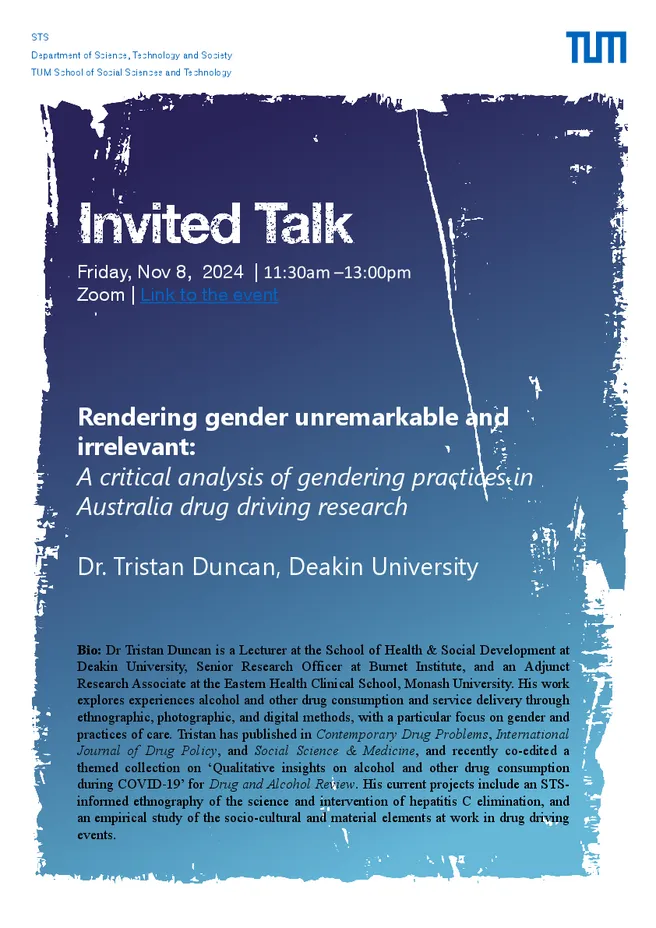INVITED TALK: “Rendering Gender Unremarkable and Irrelevant” by Dr Tristan Duncan (Deakin University)
When: November 8, 2024 at 11:30 am
Where: via Zoom via this link
On November 8th at 11:30 am Dr Tristan Duncan will give an invited talk entitled “Rendering gender unremarkable and irrelevant: A critical analysis of gendering practices in Australia drug driving research”. In this collaborative research co-authored with Michael Savic, Emily Brennan, Leaane Francia and Victoria Manning from Turning Point, Eastern Health Clinical School of Monash University, Dr Duncan will address one of Australia’s most prominent and controversial road safety concerns. While scientific research has played a key role in measuring the extent and nature of the drug driving ‘problem’, the knowledge-making practices and evidentiary regimes that comprise this field have received limited scrutiny. Our research responds to this oversight by focusing on one of the more conspicuous aspects of drug driving research: the overrepresentation of men in drug driving statistics. Specifically, we build on prior analyses of gendering practices in alcohol research to examine how gender and its intersections with class and race have been addressed and constituted in Australian quantitative and qualitative drug driving research. In doing so, we identify a tendency across epidemiological drug driving research to overlook and underplay the gendered disparities identified in their data, including the disproportionate involvement of men in positive road-side drug detections and fatal and non-fatal drug driving accidents. Gender emerges here as a hollow marker of patterned differences—a means of identifying categorical, yet ostensibly superfluous, disparities in drug driving involvement. We argue that a near endemic disinterest in gender across Australian drug driving research is further sustained by a series of knowledge-making conventions, including an implicit reliance on criminological and individualising behavioural theories; the conflation of gender with sex; the homogenisation of men and women’s accounts in qualitative empirical research; and a parochial emphasis on the agency of drugs in drug-driving incidents. We suggest these practices reify a generic, degendered, and limited vision of Australia’s drug driving ‘problem’, a vision which sustains scholars’ calls for expanded law enforcement countermeasures. By way of conclusion, we seek to trouble these tendencies. We draw on feminist scholarship on gender and mobilities to help generate new pathways for drug driving research, pathways that we argue can lead to more ethical and productive drug driving realities and interventions.
Dr Tristan Duncan is a Lecturer at the School of Health & Social Development at Deakin University, Senior Research Officer at Burnet Institute, and an Adjunct Research Associate at the Eastern Health Clinical School, Monash University. His work explores experiences alcohol and other drug consumption and service delivery through ethnographic, photographic, and digital methods, with a particular focus on gender and practices of care. Tristan has published in Contemporary Drug Problems, International Journal of Drug Policy, and Social Science & Medicine, and recently co-edited a themed collection on ‘Qualitative insights on alcohol and other drug consumption during COVID‐19’ for Drug and Alcohol Review. His current projects include an STS-informed ethnography of the science and intervention of hepatitis C elimination, and an empirical study of the socio-cultural and material elements at work in drug driving events.
The talk is organized as part of DAAD/Veski bilateral academic exchange between Dr Aysel Sultan (Senior Lecturer at the Science and Technology Policy Group) and Dr Tristan Duncan. In 2023, Drs. Sultan and Duncan have investigated the topic of “Addressing gender-specific needs in drug service settings: an analysis of gender-responsive design in action” having spent research visits in Melbourne and Munich. More information about this project can be found here.
